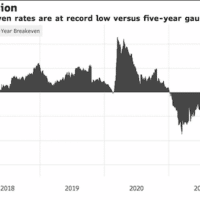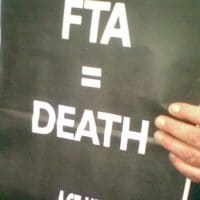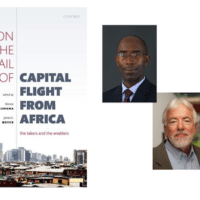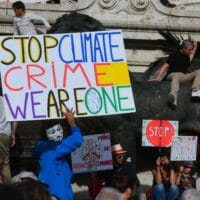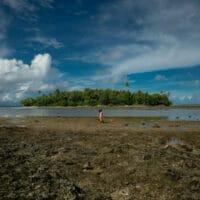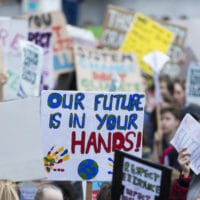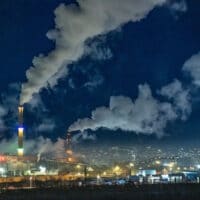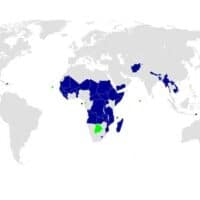-
Stagflation: From tragedy to farce
SYDNEY and KUALA LUMPUR. Half a century after the 1970s’ stagflation, economies are slowing, even contracting, as prices rise again. Thus, the World Bank warns, “Surging energy and food prices heighten the risk of a prolonged period of global stagflation reminiscent of the 1970s.”
-
Neo-colonial currency enables French exploitation
SYDNEY and KUALA LUMPUR. Colonial-style currency board arrangements have enabled continuing imperialist exploitation decades after the end of formal colonial rule. Such neo-colonial monetary systems persist despite modest reforms.
-
Africa taken for ‘neo-colonial’ ride
SYDNEY and KUALA LUMPUR. Like so many others, Africans have long been misled. Alleged progress under imperialism has long been used to legitimize exploitation. Meanwhile, Western colonial powers have been replaced by neo-colonial governments and international institutions serving their interests.
-
Weaponizing Free Trade Agreements
Long seen as means to seek advantage on the pretext of providing mutual benefit, free trade agreements may increasingly become economic weapons in the new Cold War, disrupting earlier globalization.
-
SWIFT dollar decline
SYDNEY and KUALA LUMPUR: U.S.-led sanctions are inadvertently undermining the dollar’s post-Second World War dominance. The growing number of countries threatened by U.S. and allied actions is forcing victims and potential targets to respond pro-actively.
-
Fighting inflation excuse for class warfare
SYDNEY and KUALA LUMPUR. A class war is being waged in the name of fighting inflation. All too many central bankers are raising interest rates at the expense of working people’s families, supposedly to check price increases.
-
When saviours are the problem
SYDNEY and KUALA LUMPUR: Central bank policies have often worsened economic crises instead of resolving them. By raising interest rates in response to inflation, they often exacerbate, rather than mitigate business cycles and inflation.
-
Out of Africa: Rich continent, poor people
KUALA LUMPUR: Capital flight from the global South is immense, with widespread adverse effects. A new book proposes measures to curb, even reverse capital flight from Africa. It also offers pragmatic lessons for many developing countries.
-
Sri Lankan economic crisis inflicted by self-serving elite
SYDNEY and KUALA LUMPUR: Once deemed a basic human needs success story, Sri Lanka (SL) is now in its worst economic crisis since independence in 1948. Nonetheless, SL’s ‘moment of truth’ now offers lessons for other developing countries.
-
Financialization at heart of economic malaise
COVID-19 has exposed major long-term economic vulnerabilities. This malaise–including declining productivity growth–can be traced to the greater influence of finance in the real economy.
-
Climate inaction, injustice worsened by finance fiasco
KUALA LUMPUR: Many factors frustrate the international cooperation needed to address the looming global warming catastrophe. As most rich nations have largely abdicated responsibility, developing countries need to think and act innovatively and cooperatively to better advance the South.
-
Climate change: Adapt for the future, not the past
Funding for developing countries to address global warming is grossly inadequate. Very little finance is for adaptation to climate change, the urgent need of countries most adversely affected. Also, adaptation needs to be forward-looking rather than only addressing accumulated problems.
-
Profiting from the carbon offset distraction
Carbon offset markets allow the rich to emit as financial intermediaries profit. By fostering the fiction that others can be paid to cut greenhouse gases (GHGs) instead, it undermines efforts to do so.
-
Climate injustice at Glasgow COP-out
Former Irish President Mary Robinson observed, “People will see this as a historically shameful dereliction of duty,… nowhere near enough to avoid climate disaster.”
-
WTO finished without TRIPS waiver
The World Trade Organization (WTO) will soon decide on a conditional temporary waiver of Trade-Related Intellectual Property Rights (TRIPS).
-
Carbon tax over-rated
Addressing global warming requires cutting carbon emissions by almost half by 2030! For the Intergovernmental Panel on Climate Change, emissions must fall by 45% below 2010 levels by 2030 to limit warming to 1.5°C, instead of the 2.7°C now expected.
-
Will Glasgow fix broken climate finance promises?
SYDNEY and KUALA LUMPUR: Current climate mitigation plans will result in a catastrophic 2.7°C world temperature rise. US$1.6–3.8 trillion is needed annually to avoid global warming exceeding 1.5°C.
-
Bleak prospects for least developed countries
SYDNEY and KUALA LUMPUR: “The outlook for LDCs is grim”. The latest United Nations (UN) assessment of prospects for the least developed countries (LDCs) notes recent setbacks without finding any silver lining on the horizon.
-
Better late than never, but act now
The world should now be more aware of likely COVID-19 devastation unless urgently checked. Last week, the World Health Organization (WHO) announced an US$8 billion plan to quickly vaccinate many more people to expedite ending the pandemic.
-
Rich countries prolong the pandemic: what Biden must do
Most rich countries have opposed most developing countries’ request to temporarily suspend World Trade Organization (WTO) intellectual property (IP) rules to more quickly contain the COVID-19 pandemic. Expectations were high as Biden had supported a patent waiver, albeit only for vaccines.

